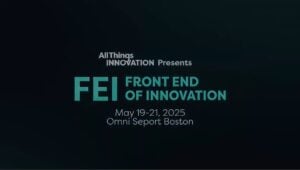Some of the key questions asked of the show delegation during the roundtable were: How do we balance the acceleration of life, with the time it takes to align things through an organization, develop and launch—there seems to be a disconnect—how do we close the gap? How do we reduce risk? Can AI foresee this for us? How do you balance close in versus adjacent innovation during times of dynamic business performance? What are your best practices to accelerate the pace of innovation while reducing uncertainty and risk? Are you and your cross-functional peers empowered to drive positive planet impact? Do you have proof points to share with the table?
Key Interdisciplinary Themes
After analyzing hundreds of takeaways from the roundtable, we asked Gemini to identify some of the core themes that can strengthen the interdisciplinary Innovation movement in a corporate organization.
- Balancing Speed and Thoroughness: Organizations often struggle to find the right balance between accelerating innovation and ensuring thoroughness in decision-making processes.
- Breaking Down Silos: The need for collaboration and communication across different departments and levels of the organization to drive innovation.
- The Importance of Strategy: Prioritizing strategic planning and avoiding reactionary decision-making can accelerate innovation efforts.
- Empowering Teams: Granting teams autonomy and trust can foster innovation and reduce the risk of micromanagement.
- Overcoming Organizational Hurdles: Addressing restrictive policies, communication challenges, and leadership biases can create a more conducive environment for innovation.
- The Role of AI and Data: Leveraging AI and data analytics can provide valuable insights and support decision-making in innovation initiatives.
More Resources from All Things Innovation
All Things Innovation recently released an FEI 2024 Post-Show Report. Showgoers participated in two robust innovation roundtables, a variety of general keynote sessions, panels on Gen Z, brunch with several bots from Mass Robotics, and more. A broad range of educational sessions were grouped by the days’ themes, which examined the role of human interactivity in innovation, the growth of artificial intelligence—and the balance of both human-centric and AI-enabled innovation. Day three also looked at the future of innovation with several key trends such as the rise of the Gen Z innovator. For the purposes of this post-show report, we selected some of the top key takeaways from FEI 2024, from almost every session.
We also examined this topic in, “Taking An Interdisciplinary Approach to Innovation.” Escaping from the silo mentality at corporate enterprises is becoming more important in innovation and to influence projects moving forward. Cross-collaboration is a mindset and skillset that is being cultivated across the organization, and it’s important for innovation to partner with marketing, sales, supply chain and other departments to succeed, and that holds true for both internal and external alliances. This mindset is also becoming increasingly prevalent to solve complex problems, and as interdisciplinary activity rises to the forefront.
Addressing Innovation’s Challenges
The roundtables at FEI highlighted the complex challenges and opportunities involved in fostering innovation within large organizations. By addressing the challenges, organizations can create a more conducive environment for innovation, break down silos, and accelerate their time to market.
In addition, the need for strong leadership fosters a culture of innovation, provides resources, and removes barriers. There is an importance in experimentation and learning. There is a value of testing ideas, iterating, and learning from failures to drive innovation. There is also a need to consider and balance both immediate and long-term objectives when making decisions about innovation.
It’s essential to strike a balance between speed and thoroughness, ensuring that innovation efforts are not compromised by a lack of planning or due diligence. Additionally, empowering teams, fostering collaboration, and leveraging data-driven insights are key strategies for driving innovation and achieving successful outcomes.
Contributor
-

Matthew Kramer is the Digital Editor for All Things Insights & All Things Innovation. He has over 20 years of experience working in publishing and media companies, on a variety of business-to-business publications, websites and trade shows.
View all posts


































































































































































































